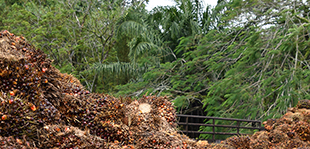Protecting rainforest regions through sustainable purchasing

Palm oil is omnipresent. It is used in food, cosmetics, cleaning agents and even biofuels. However, palm oil cultivation is often fraught with problems, being partly responsible for slash & burn methods, eviction and the loss of habitat.
The public sector in Germany spends over EUR 350 billion each year for products and services. This results in a great deal of responsibility for the protection of climate and biodiversity, but at the same time it also creates a strong position and a pioneering function on the market. Together with other European states, Germany has committed itself to achieving 100% sustainable palm oil on the market by 2020.
The German NGO Deutsche Umwelthilfe e.V. (DUH) will accompany municipalities, public institutions and other interested institutions in Germany until 2021, helping them to convert their procurement to sustainable palm oil. The DUH team is part of the GIZ project, “Sustainable and climate-friendly palm oil production and procurement“.
Significant regional differences
One major hurdle for promoting sustainable cultivation is that more sustainable palm oil is currently produced than purchased. There is hardly any price advantage for sustainable palm oil and therefore no economic incentive. The DUH also clears up misunderstandings about vegetable oil from Asia. For example, frequently a general boycott of palm oil is demanded. However, NGOs and scientists like the International Union for Conservation of Nature (IUCN) believe that this would probably further aggravate the land use problems.
To provide authentic information and recommendations, the DUH team visited the cultivation regions in Eastern Borneo and Southern Thailand in September and October 2019, interviewing smallholders and cooperatives, and holding talks with government representatives, local politicians and NGOs. The clear result of these discussions was that the cultivation of oil palms is of great importance for the local population. While the sustainable cultivation of palm oil is still in its infancy in the Indonesian region of East Kalimantan and illegal slash & burn is the rule rather than the exception, the situation is quite different in southern Thailand, where a high degree of professionalism is prevalent. Agriculture is at a high level in the region, enabling small farmers and cooperatives to earn good incomes.
The DUH is now passing on this experience to the public sector in Germany, incorporating it into procurement guidelines for municipalities, federal states and the federal government. This will help to establish products with certified palm oil on the market.
The link has been copied to the clipboard
Contact
IKI Office
Zukunft – Umwelt – Gesellschaft (ZUG) gGmbH
Stresemannstraße 69-71
10963 Berlin


